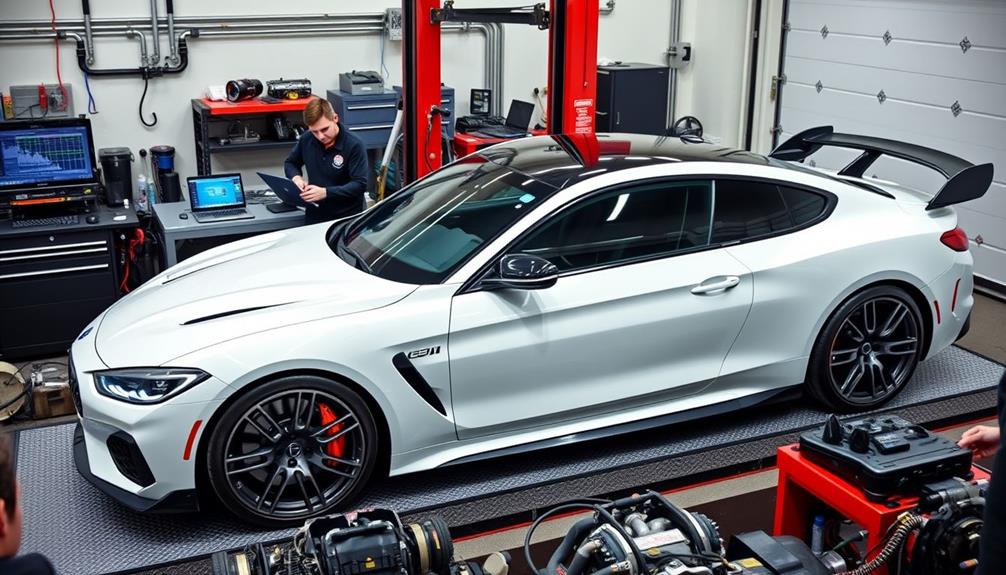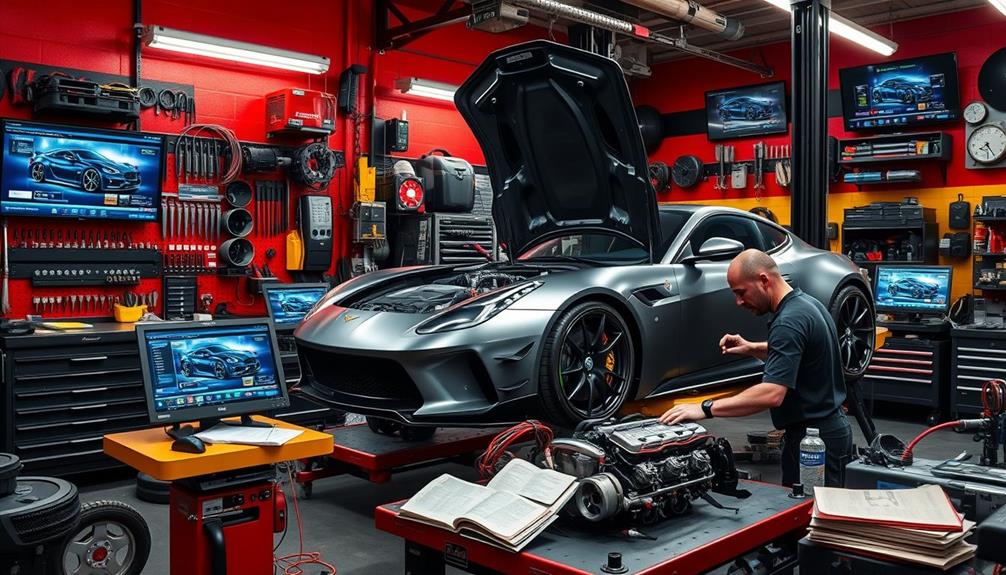To maximize your car's performance, start by researching local tuning experts who specialize in performance modifications. Ask for recommendations from car enthusiasts, check online reviews on platforms like Yelp, and engage with community forums. Look for shops with certified technicians and positive customer feedback. Prioritize those with experience specific to your car's make and model. Consider visiting automotive events to connect with professionals directly. Finally, verify they utilize modern tools like dyno tuning for precise performance measurements. This approach sets you up for success, and there's plenty more helpful information to uncover as you explore your options.
Key Takeaways
- Seek recommendations from automotive clubs and car enthusiasts for trusted local tuning experts.
- Check online reviews on platforms like Yelp to gauge the reputation of tuning shops.
- Participate in social media groups and forums to discuss and find reputable tuners.
- Verify the qualifications and certifications of technicians to ensure quality tuning services.
- Research local regulations regarding emissions and modifications to avoid legal issues post-tuning.
Understanding Car Tuning
Car tuning is all about enhancing your vehicle's performance through various modifications. When you engage in tuning, you're looking to improve horsepower, torque, and fuel efficiency—sometimes by as much as 10% to 20%.
One of the most effective methods is dyno tuning, which precisely measures your car's power and torque output under controlled conditions. This allows you to optimize air-fuel ratios and ignition timing, ensuring maximum efficiency and performance.
Before you start tuning, you need to prioritize engine maintenance. Existing mechanical issues can lead to problems during the tuning process, so a well-maintained engine is essential for successful upgrades.
Make sure to check fluid levels, replace worn parts, and address any performance issues beforehand.
Engine tuners often use various tools, like handheld tuners and specialized software, to customize your vehicle's settings. These tools not only enhance the tuning process but also provide data logging and diagnostic capabilities.
Remember, while tuning can vastly improve performance, you must adhere to emissions regulations to avoid voiding warranties and facing potential legal issues.
Finding Local Tuning Experts

Finding the right tuning expert can greatly impact your car's performance enhancements. Start by asking for recommendations from fellow car enthusiasts or local automotive clubs; word of mouth can help you find a tuning shop that's reputable. Online platforms like Yelp are also valuable—read reviews and customer feedback to assess quality and reliability.
Consider checking social media groups or forums focused on car tuning. These platforms often feature discussions about local experts and their services. Additionally, researching tuning shops' websites can provide insights into their credentials and successful projects.
Lastly, visiting local automotive events or car shows lets you network with tuning professionals and gather firsthand information about their work and customer satisfaction.
Here's a helpful table to summarize your options:
| Method | Pros | Cons |
|---|---|---|
| Recommendations | Personal experiences & trust | Limited options |
| Online Reviews | Variety of opinions & ratings | May not reflect recent changes |
| Automotive Events | Direct interaction & networking | Time-consuming |
Evaluating Tuner Qualifications

Choosing the right tuner for your vehicle is essential, so you'll want to examine their qualifications thoroughly. Start by evaluating their experience and reputation within the automotive performance community. Reputable shops typically showcase proven track records of successful builds and satisfied clients.
Next, look for certifications or endorsements from recognized automotive organizations. These can indicate a tuner's commitment to industry standards and best practices. Customer reviews and testimonials are also invaluable; they give you insights into previous clients' satisfaction, particularly regarding performance improvements and reliability.
Additionally, guarantee the tuner has access to modern diagnostic tools and dyno equipment. This access demonstrates their capability to provide precise and effective tuning services.
You should also inquire about their knowledge of specific vehicle makes and models. Specializing in certain brands can greatly impact the tuning quality and performance outcomes you experience.
Importance of Dyno Tuning

When you're tuning your car, dyno tuning is essential for achieving precision performance measurements.
It allows you to make enhanced engine optimizations by replicating real driving conditions and providing accurate data on power and torque.
Precision Performance Measurements
While many enthusiasts rely on road tests for performance tuning, nothing beats the precision of dyno tuning for achieving superior vehicle performance.
Dyno tuning provides precise measurements of your car's torque, power output, and air-fuel ratios. This data allows for ideal performance adjustments that are vital for getting the most out of your vehicle.
Here are three key benefits of dyno tuning:
- Controlled Environment: A dynamometer replicates real driving conditions, ensuring accurate data collection compared to traditional road testing.
- Immediate Feedback: Dyno tuning allows for real-time adjustments, resulting in faster and safer performance optimization.
- Power Gains: Accurate dyno measurements can lead to horsepower increases of 10% to 20%, depending on your vehicle and the tuning decisions made.
Investing in quality dyno services is essential for performance shops aiming to deliver high-quality outcomes.
With precise adjustments and reliable data, you can greatly enhance your vehicle's performance, ensuring it operates at its best on the road.
Enhanced Engine Optimization
For ideal engine performance, dyno tuning is indispensable in today's competitive automotive landscape. It provides you with precise data on your vehicle's torque, power, and air-fuel ratios, allowing for peak engine performance in a controlled environment.
Unlike road tuning, dyno tuning usually results in faster and safer performance enhancements due to its accuracy and ability to replicate real driving conditions.
Investing in a dyno is vital for achieving reliable tuning outcomes. It enables you to make tailored adjustments based on your vehicle's specific performance metrics, maximizing efficiency. With dyno tuning, you can expect horsepower gains ranging from 10% to 20%, depending on your vehicle and the tuning quality.
Additionally, regular use of a dynamometer during tuning sessions helps identify pre-existing engine issues. This guarantees that all modifications contribute positively to your overall performance.
Setting Performance Goals
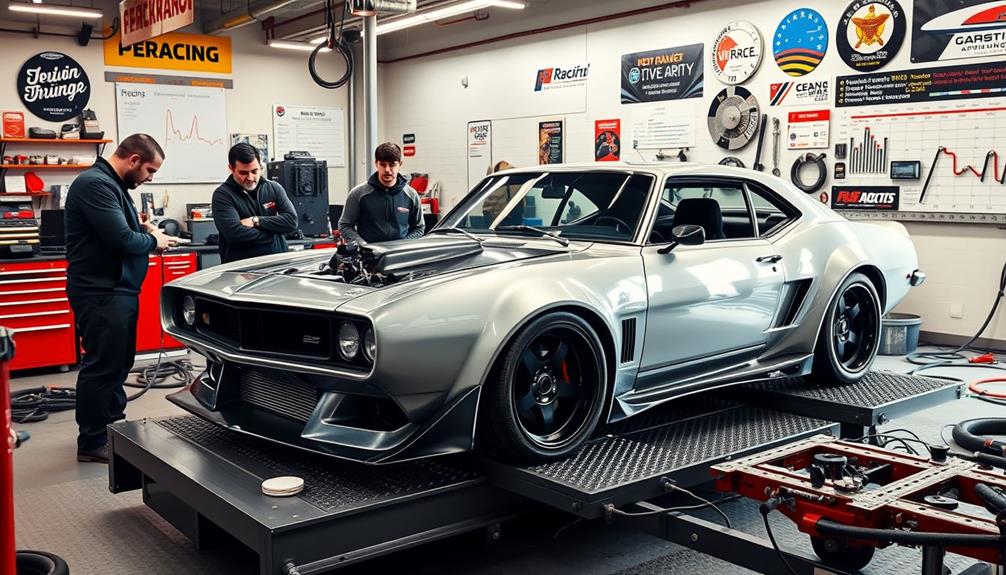
Setting clear performance goals is essential for a successful car tuning experience. By identifying specific metrics, you can guarantee that the tuning process aligns with your expectations. Start by considering what you want to achieve, whether it's increased horsepower, improved torque, or better fuel efficiency.
To set effective goals, keep these points in mind:
- Research Performance Metrics: Look into the typical performance improvements for your vehicle make and model. Expect gains between 10% to 20% in horsepower, which can help you set realistic targets.
- Assess Your Vehicle's Use: Think about how you'll use your vehicle. Whether it's for daily driving, racing, or towing, your intended use will considerably impact your performance goals and tuning decisions.
- Evaluate Existing Conditions: Before tuning, assess your engine's current condition. Pre-existing issues can hinder your progress and lead to unexpected costs, so it's critical to address these beforehand.
Document your performance goals clearly, as this will help you communicate effectively with tuning experts. This way, they can tailor their services to meet your specific needs, guaranteeing a more successful tuning outcome.
Maintenance for Optimal Performance
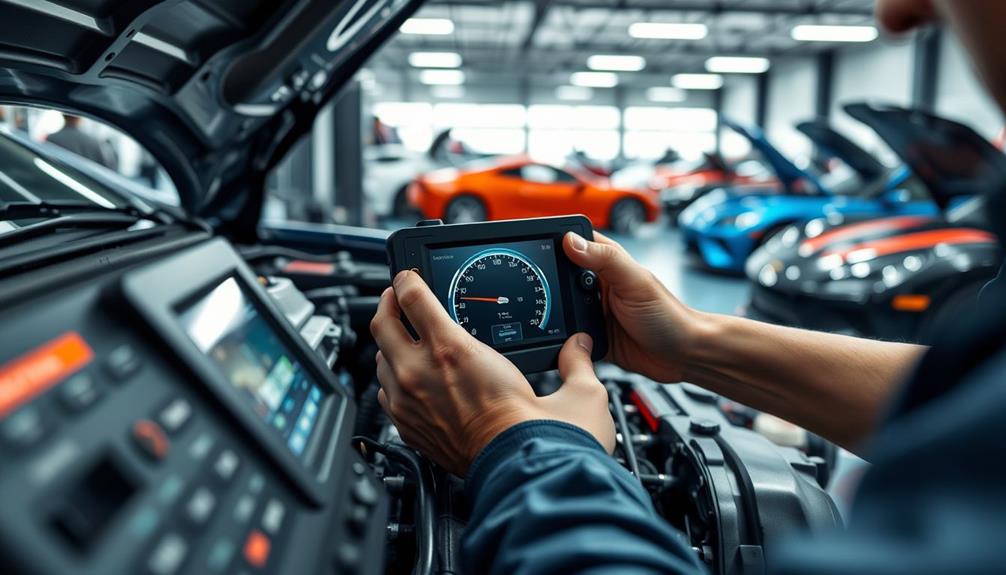
To achieve ideal performance from your car, regular engine inspections are a must.
Keeping an eye on fluid levels and sticking to scheduled tune-up intervals can prevent many issues before they arise.
Regular Engine Inspections
Regular engine inspections play an important role in keeping your vehicle running smoothly and efficiently. By identifying potential issues early, you can prevent costly repairs and guarantee peak performance throughout your car's lifespan.
It's essential to conduct these inspections at least once every 5,000 to 7,500 miles, or as specified in your vehicle's owner's manual.
During an inspection, a certified technician will typically check:
- Oil Levels: Confirming your oil is clean and at the right level is crucial for engine lubrication.
- Coolant System: A well-functioning coolant system prevents overheating and maintains engine temperature.
- Air Filters and Spark Plugs: Clean air filters and functioning spark plugs are significant for efficient combustion and engine performance.
Regular inspections not only enhance performance but can also improve fuel efficiency by up to 10%. This means you'll save money at the pump over time.
With a certified technician evaluating your engine health, you can rest easy knowing that your vehicle is in good hands, and any necessary maintenance or tuning services can be accurately recommended.
Prioritize engine inspections, and your vehicle will thank you!
Fluid Levels Maintenance
Maintaining proper fluid levels is essential for your vehicle's performance and longevity. Regularly checking fluids like engine oil, coolant, transmission fluid, and brake fluid can prevent serious issues down the line.
As with the increasing demand for skilled professionals in various sectors, guaranteeing your vehicle is well-maintained is critical for peak operation, much like how AI Ethicist Jobs are fundamental for the development of trustworthy technologies. Low engine oil levels increase friction and wear, which can lead to catastrophic engine damage if left unchecked. Make it a habit to inspect your oil regularly and top it off as needed.
Coolant levels are equally important. If your coolant is low, your engine can overheat, causing components to warp or fail. Keep an eye on your coolant reservoir and refill it according to your vehicle's specifications.
Don't overlook your transmission fluid, either. It needs to be at the correct level for smooth shifting. Insufficient transmission fluid can lead to overheating and costly repairs.
Lastly, brake fluid is essential for your vehicle's stopping power. Low brake fluid levels can result in brake failure, so always check it regularly and replace it as recommended by your vehicle manufacturer.
Scheduled Tune-Up Intervals
Scheduled tune-up intervals play an essential role in keeping your vehicle running at its finest. Typically, these intervals range from every 5,000 to 7,500 miles, depending on your vehicle's model and manufacturer recommendations.
Regular tune-ups not only guarantee peak engine performance but also extend your car's longevity.
During a scheduled tune-up, focus on these key maintenance tasks:
- Spark Plug Replacement: Worn spark plugs can hinder ignition efficiency, so replacing them guarantees improved fuel efficiency and power output.
- Fuel Filter Inspection: A clogged fuel filter can disrupt fuel flow, negatively impacting engine performance. Regular checks keep your system running smoothly.
- Air Filter Replacement: Changing the air filter every 15,000 to 30,000 miles guarantees proper air intake, enhancing combustion efficiency.
Additionally, don't overlook oil changes, which should occur every six months or 5,000 miles to maintain cleanliness and reduce wear on engine components.
Ignoring these scheduled intervals can lead to decreased performance, increased fuel consumption, and costly repairs.
Stay proactive, and schedule your tune-ups to keep your vehicle performing at its highest!
Legal and Warranty Considerations
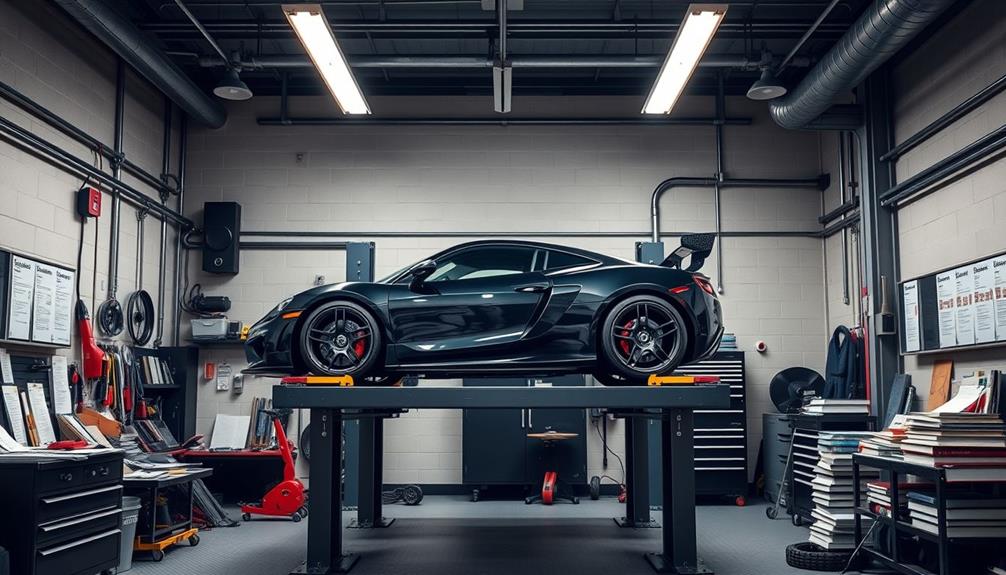
When tuning your car, understanding the legal and warranty implications is crucial. First, confirm that any modifications you make comply with local emissions regulations. Ignoring these can lead to hefty legal penalties.
Before you proceed, check with your vehicle's manufacturer about their policy on modifications. Some aftermarket tuners might void your warranty, which could leave you high and dry if something goes wrong.
Keeping thorough documentation of all modifications is essential for maintaining warranty coverage. This paperwork can also greatly influence your car's resale value down the line.
Additionally, stay on top of regular updates and maintenance for your tuner. This confirms compliance with any changing regulations and helps you avoid potential legal issues.
Lastly, be aware that modifications can lead to increased insurance premiums. It's a smart move to inform your insurance provider about any tuning changes you make. This way, you'll be protected and avoid surprises later on.
Frequently Asked Questions
How Much Does It Cost to Get Your Car Tuned Up?
Getting your car tuned up usually costs between $100 and $400 for a basic tune-up. Performance tuning can range from $500 to over $2,000, depending on services, complexity, and any additional parts needed.
How Much Does It Cost to Get a Car Custom Tuned?
Custom tuning for your car typically costs between $300 and $1,500. Factors like the vehicle type, tuning method, and additional modifications can influence the price, so be prepared for potential extra expenses down the line.
How Do I Find Someone to Tune My Car?
Finding someone to tune your car's like searching for a trusted mechanic; ask fellow enthusiasts for recommendations, check reviews, and look for shops with dyno services. Ascertain they understand emissions regulations to avoid future headaches.
Where Can I Improve My Car Performance?
To improve your car's performance, you'll want to explore reputable performance shops that specialize in tuning. They can provide expert insights, optimize your setup, and enhance your vehicle's power, efficiency, and overall driving experience. When searching for the best car tuning shops near me, it’s important to consider the reputation and experience of the shop, as well as the specific services they offer. Reading reviews and asking for recommendations from fellow car enthusiasts can help narrow down the options and find a shop that best suits your needs. Additionally, be sure to inquire about the shop’s previous work and ensure they have a proven track record of delivering high-quality performance enhancements.
Conclusion
In summary, finding the right tuning expert can greatly enhance your car's performance. Did you know that properly tuned vehicles can improve fuel efficiency by up to 15%? By setting clear performance goals and regularly maintaining your car, you'll not only enjoy a thrilling driving experience but also save money at the pump. So, take the time to research and connect with qualified tuners to release your car's true potential!
